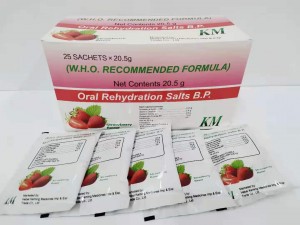Dehydration occurs when the body loses more fluid than it takes in. This can happen for a number of reasons, including excessive diarrhea or vomiting.
Dehydration can be dangerous if left untreated. This is because your body relies on water for essential functions.
Oral rehydration is a treatment for dehydration. It involves drinking a drink made up of water, sugar, and electrolytes (especially potassium and sodium). This drink is called oral rehydration salts (ORS).
The purpose of oral rehydration is to replenish fluid levels in the body. It is often used to treat mild dehydration caused by diarrhea, vomiting, or other conditions.
But for mild dehydration, oral rehydration salts are ideal. In addition to water, ORS also contains a certain amount of glucose and electrolytes. Electrolytes are potassium and sodium.
These ingredients maximize fluid absorption in the gastrointestinal tract. The gastrointestinal tract is dependent on sodium and glucose co-transporters (SGLT), which are carrier proteins in enterocytes. Cotransporters help move substances across membranes.
In particular, SGLT binds the transport of sodium and glucose in the small intestine. This allows glucose to increase fluid absorption.

In addition, glucose is required for proper absorption of sodium. This is why ORS contains both glucose and sodium.
Since 1975, WHO and UNICEF have used ORS to treat dehydration caused by diarrhea. It is often used in countries with limited pure water or other hydration options.
Oral rehydration therapy has a high success rate. According to a 2018 study, oral rehydration therapy has prevented 54 million diarrhea deaths since 2007. The therapy has also reduced child deaths from diarrhea by two-thirds since 1980.
Oral rehydration is safe for children. It is often used to treat dehydration associated with diarrhea in children.
Children are more susceptible to dehydration from diarrhea than adults. They have a higher metabolic rate, which means their bodies use water quickly. Children may also be unable to recognize thirst or rehydrate themselves.
Factors such as burns, excessive sweating, or low fluid intake further increase the risk of dehydration.
Oral rehydration therapy may also be used in the elderly and people with health problems. Like children, these people are at a higher risk of dehydration.
Generally, healthy adults with mild diarrhea can also drink ORS, but this may not be necessary. They can usually be rehydrated with water, broth, or a sports drink containing electrolytes.
Oral rehydration is aimed at normalizing electrolyte levels. However, if the solution is not prepared or used correctly, salt poisoning can occur. This is also called hypernatremia.
Oral rehydration salts can cause salt poisoning if used incorrectly. This is more likely if you take ORS when you don’t really need them.
If you develop severe diarrhea or vomiting, check with your doctor first. They can determine if you need oral rehydration solutions or if drinks like water are enough.
Similarly, if you think you are dehydrated, see your doctor first. Your need for ORS depends on many factors, including your age and general health.
Nasogastric feeding may be used if the person is unable to drink due to vomiting. It delivers ORS through a nasogastric tube, which is inserted through the nose into the stomach.
When dehydrated, it is not recommended to use homemade ORS. Over-the-counter or prescription ORSs are safer options.
Oral rehydration salts are usually available as a packaged powder. These powders are designed to dissolve in water.
This is because your age determines how much fluid your body needs to function. Young children are naturally smaller and therefore need fewer things. Adults need more because their bodies are bigger.
Except for severe dehydration, which requires intravenous fluids. This treatment can quickly replace lost fluid in an emergency.
Mild dehydration can usually be treated with liquids such as water and clear soups. However, symptoms of moderate to severe dehydration warrant a visit to the doctor.
Oral rehydration salts are used to treat mild dehydration. It consists of water, glucose, sodium and potassium. This combination optimizes fluid absorption from the intestines and promotes rapid fluid replacement.
This solution is often used to treat dehydration caused by diarrhea or vomiting. You can buy it without a prescription or get a prescription.
Talk to your doctor if you develop severe diarrhea or vomiting. They can determine if you need oral rehydration solutions or if you can rehydrate with plain water.
Our experts constantly monitor the world of health and wellness and update our articles as new information becomes available.
Hypertensive dehydration occurs when there is too much salt and not enough water in the body. Find out more here.
We will discuss severe dehydration in adults, children, and pregnant women. If you feel thirsty, you may be dehydrated.
Dehydration occurs when the body loses more fluid than it receives. The most common cause of water loss in the body is excessive sweating.
There is evidence that A2 milk is healthier than A1 milk. This article details the scientific debate about A1 and A2 milk.
People with nausea seem to tolerate certain foods and drinks better than others. Here are the best foods and drinks to drink when you’re sick.
Chia seeds are versatile and rich in nutrients. Here are 7 science-backed benefits of chia seeds.
Eating the right foods when you are sick can pay big dividends. Here are 15 of the best foods to eat for a cold, flu, nausea, or other illness…
Sweet potatoes are a popular root vegetable rich in vitamins, minerals, antioxidants, and fiber. Here are 6 amazing health benefits of sweets…
Post time: Jul-18-2023




